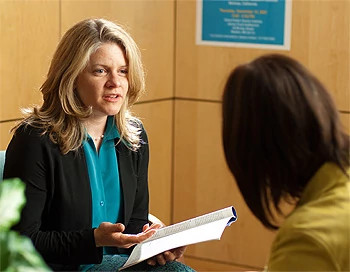Watch more videos about cervical cancer risk, prevention, and treatment.
What are the symptoms of cervical cancer?
The signs and symptoms for cervical cancer can include vaginal bleeding, unusual vaginal discharge, pelvic pain or back pain, and bleeding after sexual intercourse. Symptoms of cervical cancer may not appear until the disease is advanced, so it is important to undergo regular screenings.
Are there ways to prevent cervical cancer?
Both the HPV vaccine and regular screenings can help reduce the risk of cervical cancer.
- HPV vaccine — The Centers for Disease Control and Prevention (CDC) recommends HPV vaccination for girls and young women between the ages of 9-26, and ideally between ages 11-12. The two available HPV vaccines — Cervarix and Gardasil — protect against HPV strains 16 and 18, which cause most cases of cervical cancer. The vaccines cannot prevent cervical cancer if the woman has already been infected with the HPV virus, so it is important to be vaccinated before the onset of sexual activity. It is also important to continue regular screenings after the vaccination, as they do not prevent against all HPV types that can cause cancer.
- Pap smear — Regular screenings that include a Pap smear can help find abnormalities in the cervix, which could be signs of cancer. During a Pap smear (also known as a Pap test), a physician uses a small brush to gently scrape the cervix, collecting cells that can be viewed under a microscope and studied for signs of cancer. Healthy women should have their first Pap screening test at age 21, and if it's normal, get one every three years until age 65. Women over the age of 30 can continue this screening schedule if results remain normal, or they can be screened with a combination of a Pap test and a high-risk HPV test every five years. It's important to speak with your doctor about what is recommended in your situation.
If I have been exposed to HPV, what are my odds of getting cervical cancer? Is there anything I can do about it?
Most people who are infected with HPV do not develop cancer. In fact, many HPV infections go away within 1-2 years.
If a woman is infected, her doctor may require more frequent screenings and Pap smears to monitor any abnormalities found in the cervix. There is currently no treatment for HPV infections, but there are surgical treatments for precancerous lesions (cervical dysplasia) if they develop. Treating these early can help prevent further development of cancer.
The longer someone is infected with the virus, the higher the chance she has for developing cancer, so it is important to undergo regular screenings.
Are men affected by HPV?
Both men and women can carry and transmit HPV. In addition to cervical cancer, HPV infections can increase risk for oropharyngeal and penile cancer. The CDC recommends HPV vaccinations for boys ages 11-12, and up until age 21. The vaccine Gardasil is approved for both boys and girls.
Additional Resources
Learn more about cervical cancer screening recommendations.
Read about Dana-Farber's HPV and Related Cancers Outreach Program.
